Neat News 2020-152 (added 2020-05-31)
Coating to protect passengers

Public Domain by NIAID Rocky Mountain Laboratories (RML), U.S. NIH
| Ruhrbahn public transport in Mülheim in Germany is starting to use a new coating, Dyphox, on surfaces such as handles and handrails, which reduces the amount of bacteria and viruses on the surfaces by 99.99 percent, making transport safer for the passengers. |
News seen at: Announcement by the city of Mülheim
Further Info (click to expand)
Neat News 2020-151 (added 2020-05-30)
Dogs to detect Corona infections

Public Domain by Izrafel Maya di Altobello
| Some dogs have learned to sniff whether a person is infected with the COVID-19 Corona virus. They may be able to detect infected persons at airports or nursing homes, for instance. |
News seen at: DW - Deutsche Welle - Coronavirus
Further Info (click to expand)
Neat News 2020-150 (added 2020-05-29)
Octopus spotted 7000m down

Public Domain by R. L. Hudson - The Cephalopoda of the Hawaiian Islands Berry, S. Stillman
| An octopus has been spotted in the Java Trench in the Indian Ocean at a depth of 7000m, that is, 2000m deeper than ever before. |
News seen at: BBC - Science & Environment
Further Info (click to expand)
Neat News 2020-149 (added 2020-05-28)
Solar plant approved in the UK

© Isofoton.es [CC BY 3.0]
| A big solar plant of more than three square kilometres has been approved for the north Kent coast. It will supply electricity to more than 90,000 homes. |
News seen at: BBC - Science & Environment
Further Info (click to expand)
Neat News 2020-148 (added 2020-05-27)
Roman mosaic found in northern Italy

| Under metres of earth, a pristine Roman mosaic has been found in a vineyard in northern Italy. |
News seen at: BBC - World - Europe
Further Info (click to expand)
Neat News 2020-147 (added 2020-05-26)
Food allergies and gut microbe

Public Domain by Bruce Wetzel, Harry Schaefer
| For some people with severe food allergies changing the gut microbes may improve their situation, since some microbes seem to be capable of suppressing immune responses. |
News seen at: Scientific American - Biology
Further Info (click to expand)
Neat News 2020-146 (added 2020-05-25)
Supermarket sells nuts and tea in returnable glasses

Public Domain by Krdan Ielalir
| In Germany a supermarket chain has started to sell nuts, nut products, and tea in glasses with refundable deposit. It is in line with other supermarkets that try to reduce plastic and other waste. |
News seen at: Only positive news (in German)
Further Info (click to expand)
Neat News 2020-145 (added 2020-05-24)
Food production in water
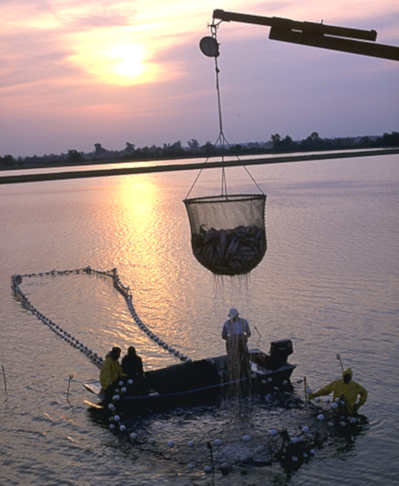
Public Domain by Ken Hammond, USDA
| The combination of the production of fish and vegetables looks promising, economically and ecologically. It may allow to complement the needs of two recirculating systems in which fish and vegetables are produced in two separate units. |
News seen at: ScienceDaily - Science & Society
Further Info (click to expand)
Neat News 2020-144 (added 2020-05-23)
Film of survival of six friends

Public Domain by Pontormo
| The Lord of the Flies is a dark novel on the bad things that may happen without the restraints of civilization. Now a film is to be made of the story of the Real Lord of the Flies, in which six teenage boys were shipwrecked in the 1960ies on a remote uninhabited island. They survived 15 months until their rescue through friendship and loyalty. |
News seen at: The Guardian
Further Info (click to expand)
Neat News 2020-143 (added 2020-05-22)
Solar and agriculture

© Isofoton.es [CC BY 3.0]
| In densely populated countries there is a competition between building solar farms and agriculture. Now new concepts are developed to allow them to coexist. The solar panels are mounted on five metre high racks and the ground below is farmed. Since the panels are placed not very densely, rain and light come to the ground to a sufficient degree. |
News seen at: Der Spiegel - Science & Environment (in German)
Further Info (click to expand)
Neat News 2020-142 (added 2020-05-21)
Bumblebees with tricks
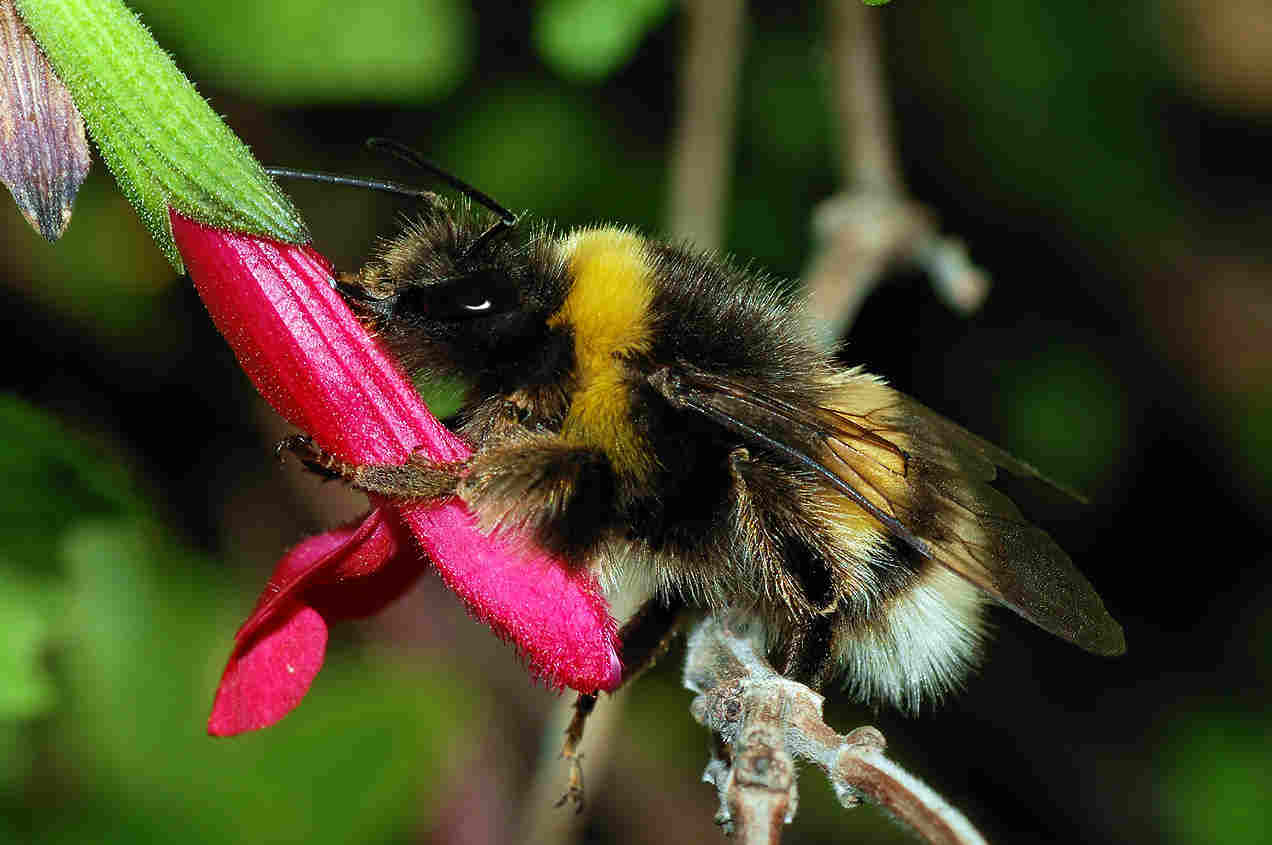
| Researchers found that bumblebees when deprived of pollen can trick plants into flowering up to a month earlier by cutting holes in their leaves. |
News seen at: BBC - Science & Environment
Further Info (click to expand)
Neat News 2020-141 (added 2020-05-20)
EU green deal

Public Domain by several Wikimedia users
| The European Commission has proposed a European Green Deal in which the use of pesticides and antibiotics in farming is to be reduced by 50 percent, the use of fertilisers by 20 percent, and animals are to be protected better. |
News seen at: DW - Europe
Further Info (click to expand)
Neat News 2020-140 (added 2020-05-19)
Part of the brain found to shut down pain

Public Domain by Johannes Sobotta
| In experiments with mice, scientists have found a part of the brain in the so-called amygdala that can essentially shut down pain. In the long run the finding may result in a new treatment for pain. |
News seen at: ScienceDaily - Top Science News
Further Info (click to expand)
Neat News 2020-139 (added 2020-05-18)
More efficient learning algorithm

© Mcstrother [CC BY 3.0]
| Training big artificial neural nets in order to apply them for solving problems can take a lot of computation resources, which need a lot of energy with a big carbon footprint. By pruning the connectivity in an intelligent way after initial steps, the energy consumption can be cut to a tenth. |
News seen at: ScienceDaily - Computers & Math
Further Info (click to expand)
Neat News 2020-138 (added 2020-05-17)
White stork hatched in UK
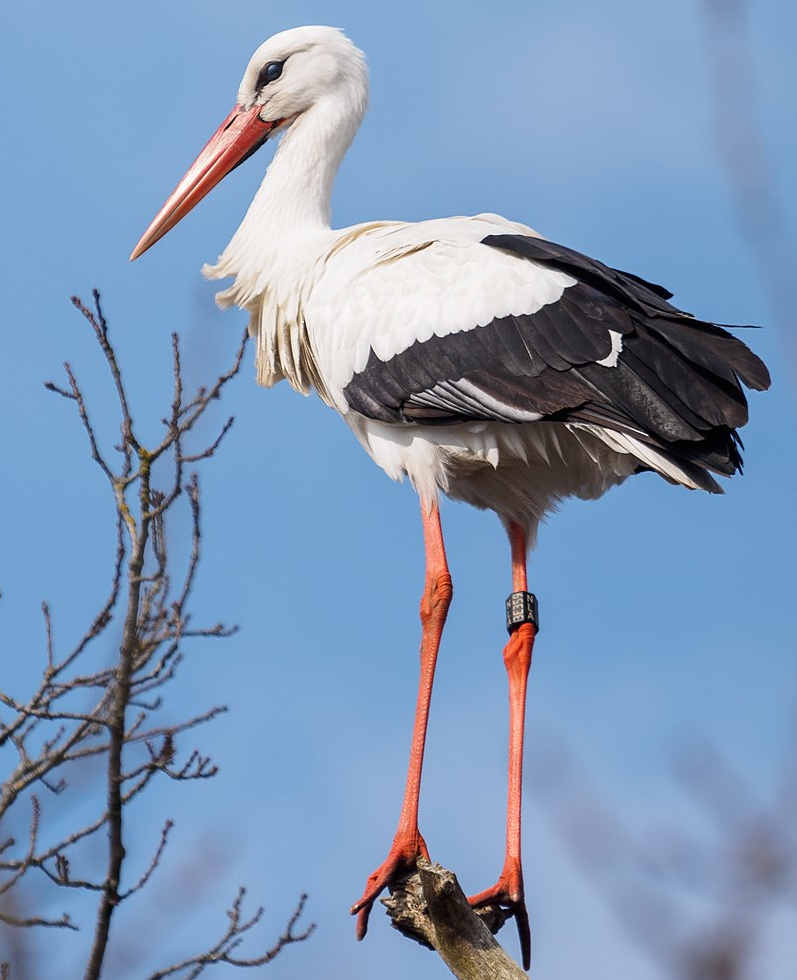
© Soloneying [CC BY-SA 4.0]
| For the first time in hundreds of years a wild white stork chick hatched in the UK in West Sussex. There were five eggs in the nest of the birds and at this moment it is not clear how many have hatched. The birds were reintroduced to the UK in recent years. |
News seen at: BBC - Science & Environment
Further Info (click to expand)
Neat News 2020-137 (added 2020-05-16)
Self-nudging for better choices
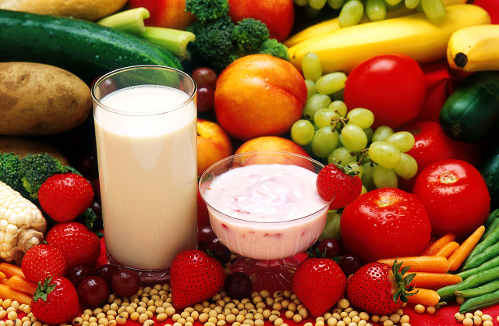
Public Domain by Peggy Greb, USDA ARS
| Sometimes we make bad choices which we know are wrong when we make them (such as eating all of the chocolate, or binge watching the whole season of a TV series). By four self-nudging tools we may prevent these: 1. Using reminders and prompts, 2. putting the decision in the right frame (not between jogging and not jogging, but between healthy and unhealthy), 3. reducing the accessibility of the bad choices, and 4. using social pressure. |
News seen at: ScienceDaily - Education & Learning
Further Info (click to expand)
Neat News 2020-136 (added 2020-05-15)
Algae to save coral reefs

Public Domain by NASA
| Rising temperatures let many coral reefs turn white and die, since algae they need cannot deal with the warmer water. Now researchers have developed algae that are more heat tolerant and can make the coral reefs survive in warmer water. |
News seen at: BBC - Science & Environment
Further Info (click to expand)
Neat News 2020-135 (added 2020-05-14)
New treatment for brain injury

Public Domain by Johannes Sobotta
| A major problem treating many brain and spinal cord injuries is that the brain swells. By giving the drug trifluoperazine such swellings can be much reduced, minimizing the damage. |
News seen at: ScienceDaily - Mind & Brain
Further Info (click to expand)
Neat News 2020-134 (added 2020-05-13)
Disinfection robot
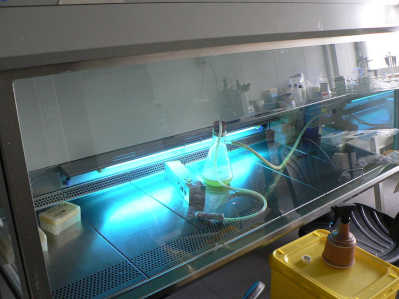
Public Domain by Newbie~commonswiki
| A robot has been built that can disinfect hospitals to 99.9 percent using UV-C light. It was developed in Denmark and is currently used in China. |
News seen at: ingenieur.de (in German)
Further Info (click to expand)
Neat News 2020-133 (added 2020-05-12)
Carbon emissions fall in India

© Isofoton.es [CC BY 3.0]
| Partly due to the Corona lock-down, but also because it is now cheaper to produce electricity using photovoltaic than using coal, the CO2 emissions in India fell by 15 percent in March and are estimated to have fallen by 30 percent in April. |
News seen at: BBC - Science & Environment
Further Info (click to expand)
Neat News 2020-132 (added 2020-05-11)
Gardens for happiness

Public Domain by Ocrho [CC0]
| A study has found that gardening at home has a positive emotional effect on people similar to biking, walking, or dining out. |
News seen at: ScienceDaily - Mind & Brain
Further Info (click to expand)
Neat News 2020-131 (added 2020-05-10)
Stopping deforestation to prevent pandemics

Public Domain by Tim35
| Stopping deforestation is an important step in preventing pandemics. Recent pandemics such as Ebola, Zika, SARS, and Covid-19 are all related to wild rain forest animals whose habitat is threatened. |
News seen at: Scientific American - Conservation
Further Info (click to expand)
Neat News 2020-130 (added 2020-05-09)
Urge to walk and cycle

Public Domain by Michael W. Parenteau
| In the current Corona pandemic many people work from home. This development may change the way how people work. For those who have to get to work the British government urges people to reconsider their way of travel and to walk or cycle more, also to reduce air pollution. |
News seen at: BBC - Science & Environment
Further Info (click to expand)
Neat News 2020-129 (added 2020-05-08)
UV LEDs against Corona virus

Public Domain by NIAID Rocky Mountain Laboratories (RML), U.S. NIH
| Currently ultraviolet LEDs are under development that can decontaminate surfaces that are polluted with the COVID-19 Corona virus. |
News seen at: ScienceDaily - Physical & Tech
Further Info (click to expand)
Neat News 2020-128 (added 2020-05-07)
Vitamin D and Covid 19
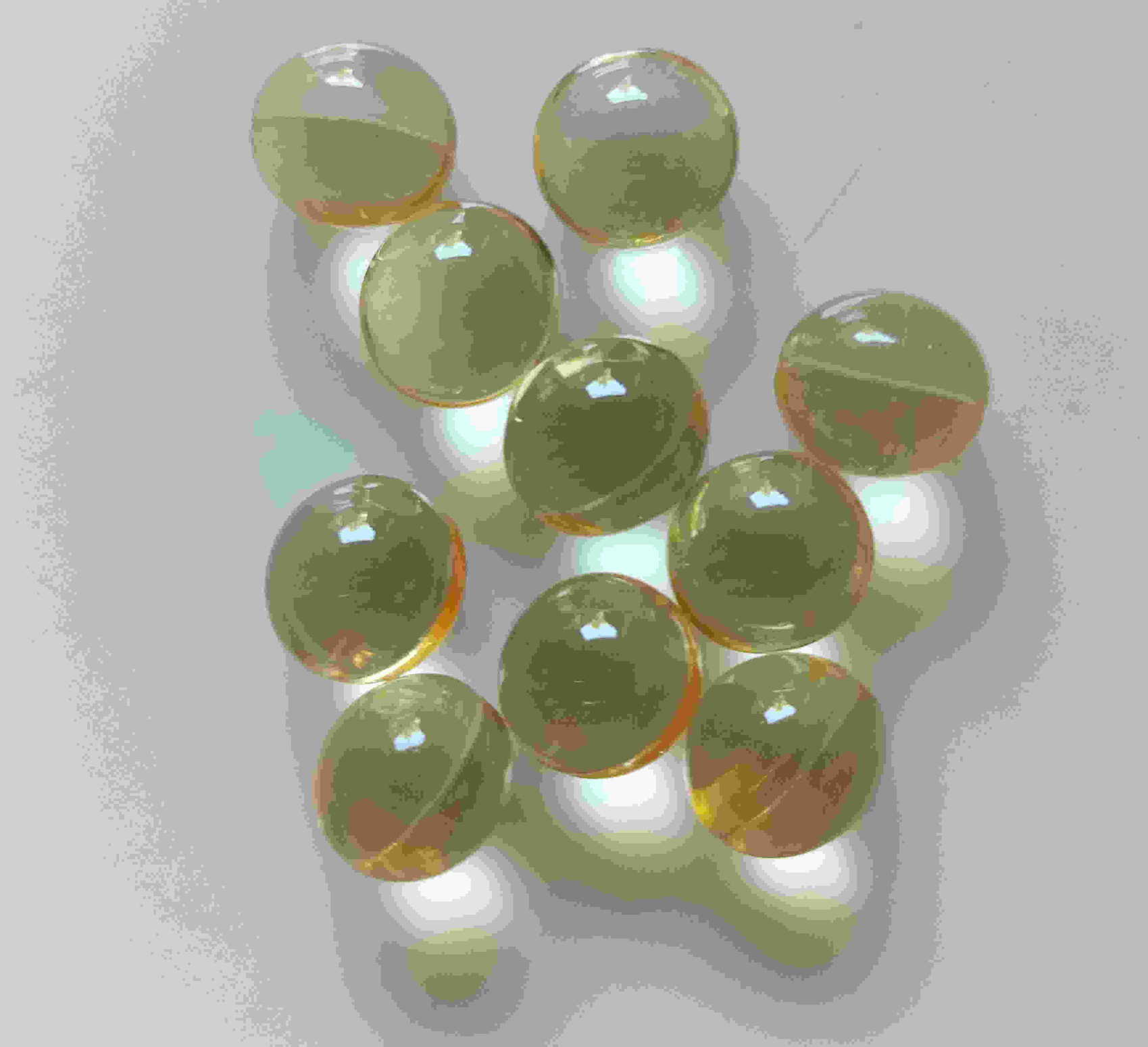
| Trying to explain the different mortality rates of Covid 19 in different countries, researchers analyzed data from 10 countries. They found that patients with severe vitamin D deficiency are twice as likely to experience severe problems from Covid 19. |
News seen at: ScienceDaily - Top Health
Further Info (click to expand)
Neat News 2020-127 (added 2020-05-06)
Black hole nearby

Public Domain by Brandon Defrise Carter (assumed) [CC0]
| From observations scientists conclude that there is a black hole about 1000 light-years away from us, which is nearby on a cosmic scale. |
News seen at: BBC - Science
Further Info (click to expand)
Neat News 2020-126 (added 2020-05-05)
Antibody blocking Covid-19

Public Domain by NIAID Rocky Mountain Laboratories (RML), U.S. NIH
| A human monoclonal antibody has been found that blocks in cell cultures the Covid-19 virus. This may be a first step towards the development of a treatment of Covid-19 infections. |
News seen at: ScienceDaily - Top Health
Further Info (click to expand)
Neat News 2020-125 (added 2020-05-04)
Fighting malaria by curing mosquitoes?

© image by Ute Frevert; false color by Margaret Shear [CC BY2.5]
| A fungus called Microsporidia MB seems to prevent mosquitoes infected by it from being infected by malaria. As a consequence these mosquitoes cannot infect people with malaria. The insight may hold an enormous potential to control malaria, which currently kills more than 400,000 people per year. |
News seen at: BBC - Health
Further Info (click to expand)
Neat News 2020-124 (added 2020-05-03)
Lin28 to regenerate nerves?

Public Domain by Tomwsulcer
| In tests with mice, a molecule called Lin28 stimulated axons to grow by more than three millimetres. This result is encouraging since a repair of spinal cord injuries may be achievable using Lin28. |
News seen at: ScienceDaily - Top Science News
Further Info (click to expand)
Neat News 2020-123 (added 2020-05-02)
Eye sends excitatory and inhibitory signals to the brain

© Rhcastilhos [CC BY-SA 3.0]
| In experiments with mice, it has been found that the retinal neurons send excitatory and inhibitory signals. Before, it was believed that only excitatory signals are sent. |
News seen at: ScienceDaily - Top Science News
Further Info (click to expand)
Neat News 2020-122 (added 2020-05-01)
Social distancing of bees

© Bilby [CC BY 3.0]
| Bees that are virus infected smell differently. This seems to be an effect of the virus so that such bees are not so easily recognized by the guards of another colony and can spread the virus. It means, however, also that an infected bee is no longer fully accepted by her own colony and other bees interact less with her and the virus spreads less in her own colony. |